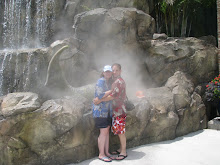In “Boy Meets Boy,” David Levithan describes a high school—and even an entire town—that is so completely different from our expected reality that it becomes almost other-worldly. He seems to throw every possible stereotype out the window when describing this world. I will admit that I was rather confused by Levithan’s strategy in creating such a setting until I read Pattee article. I didn’t realize that the creation of a fictional utopia was a literary strategy—especially one that has the express intent of making society aware of the need for social change. It makes sense to use something like this. It is an eye-catching strategy and it compels the reader to compare this fictional setting to reality. I also have to mention that I got a kick out of seeing Pattee quote the ever interesting Trites!
Levithan’s use of a utopian setting became very clear once I became aware of its existence! To be perfectly honest, I felt both overwhelmed and entertained by Levithan’s fast moving narration. My biggest weakness in reading is that when I cannot relate to any of the characters, I give up reading altogether. I was afraid that I would find this novel hard to relate too, but Levithan pulled me in the moment I began to read, and held my attention until I found a character that I could find commonality in. Once I realized that the setting was deliberate, things began to fall into place. However, I find myself torn as to whether I like the use of utopia or not.
I think that Levithan uses this Utopian technique to serve his purposes well. Like Pattee says in her Trites quote, “Boy meets Boy becomes a tool for making sexuality visible” (169)—and it does. The reader cannot help but to suddenly stop think about how very different our world is compared to Levithan’s utopia. However, my next thought is not, “how can I make my world like this?” It tends to be, “this situation is so unrealistic that I cannot imagine it ever happening.” If Levithan wanted to actually change how society works, I think he would be better served by creating a story within a traditional setting—but this is only my opinion. Pattee mentions the problem with using traditional conventions to try and assert a new reality when she quotes Trites as saying that such novels tend to “undermine that alleged liberation” (169).
I’m not sure if I would want to teach this novel to a high school English class. I feel that it plays with concepts that are extremely important for high school students to grasp. First of all, Levithan emphasizes tolerance. I think that too many high school students are intolerant because they are afraid that tolerance means that you have to go against what you believe—I often find myself caught up in that fear. (And of course, many students are intolerant simply because they do not understand other people). Tolerance is about showing genuine respect to every individual regardless of how different they are from you. What I didn’t like about this novel is that the entire middle section is nothing but drama! I guess it fits with the age group that Levithan is writing for, but I wouldn’t use any other book that was so filled with pointless drama. I chalked it up to trying to bring the familiar into a situation that is so completely different from ours, but it seems to undermine Levithan’s initial push as a utopian setting. I understand why he does it; it just doesn’t work for me.
I typed in "what does tolerance mean" on google and found a website for something called the "Museum of Tolerance." The first page talks about what tolerance means, and then it goes on to discuss why it is so important. The museum focuses a lot on anti-semitism, but it also has all kinds of exhibits on the Civil Rights Movement, and even the idea of "personal responsibility." The museums are in CA and NY, but I think the website itself has some great information. www.museumoftolerance.com
What Do You Mean No More Books?!?!
14 years ago






I agree with your opening thoughts. I didn't think I would get into this book very much, because it was hard for me to get into the last book even though I had much in common with the narrator. However, Levithan really pulled me in. I liked these characters and these personalities and I think they worked. Once I got about halfway through and put aside the idea that this happens in a real place, I found myself really immersed in it and really connecting to the characters as they struggled with the "Self." Their issues became my issues, even though our issues are different. I enjoyed discovering more about myself and how I would handle adversity as I read about the characters doing the same.
ReplyDeleteI liked this quote from your blog:
ReplyDelete"I think that too many high school students are intolerant because they are afraid that tolerance means that you have to go against what you believe."
Teaching this novel with a theme of tolerance for others would be a good way to go...similar to what Megan suggested with her alternate materials. Great point!
I liked how you described the text as "other-worldly." I had a tough time trying to paint a picture of this book in my head, which made it very difficult to read. There is no way I will teach a book of this kind in my classroom, not because of it's "message" but how the author portrays his message with unrealistic situations/characters.
ReplyDelete